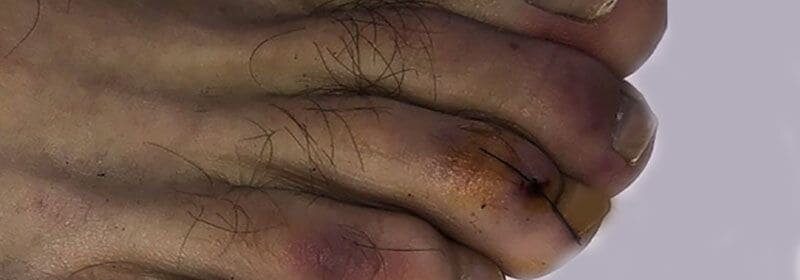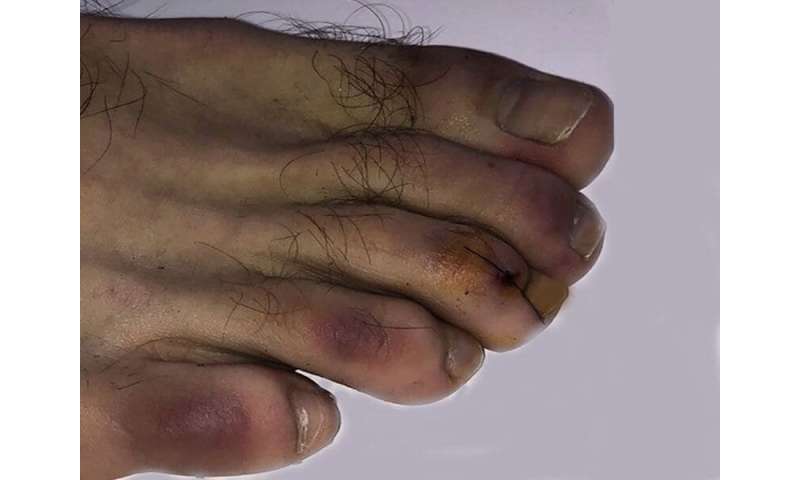More symptoms of coronavirus: COVID toes, skin rashes

(HealthDay)—The virus that causes COVID-19 typically strikes the lungs with full force, but new research shows it can also cause frostbite-like patches on the hands and toes, and rashes on the body.
The condition has recently been dubbed “COVID toes.” Fortunately, it isn’t serious and the lesions usually disappear on their own, said Dr. Esther Freeman, director of Global Health Dermatology at Massachusetts General Hospital in Boston.
“One of the more surprising findings in this epidemic has been the lesions that we’re seeing on people’s toes and hands,” she said.
Freeman noted that COVID toes aren’t caused by exposure to cold, as is frostbite or chilblains. Rather it seems to be an inflammation of the circulatory system that shows up as a skin rash.
“It’s really important to reassure the public that most of our patients who are developing COVID toes are doing very well, so they’re often patients who have a benign clinical course. They either are having mild disease or often their only symptom might be their toes,” she said.
Freeman said that COVID toes don’t just happen to children, as some have believed—adults also get them.
Should you develop COVID toes, you’re not likely to end up in an intensive care unit. “That’s not what we’re seeing in the data,” said Freeman.
Skin rashes aren’t always associated with viruses, but measles, herpes and chickenpox are conditions where skin eruptions are the main symptoms, so it’s not unheard of, Freeman noted.
She can’t say how common COVID toes are because the data that would include the number of cases of COVID-19 and COVID toes doesn’t exist. Freeman is compiling a registry of known COVID toe cases.
Anecdotally, she’s seeing a lot more cases than usual. “In addition to running the registry, I see patients myself through tele-dermatology at Massachusetts General Hospital, and I have seen more toes in the past two weeks than I have in the rest of my career,” Freeman said.
If you have what you think might be COVID toes, don’t panic, Freeman said. Don’t rush off to the emergency room, but don’t ignore it either. The best thing to do is contact your doctor or dermatologist, she added.
Also, don’t try to get a COVID-19 test. “You should talk to your health care provider and decide the risks and benefits for your particular case. It’s important to go by local testing guidelines. It’s not as simple as a yes-no, but I think that it should be considered a COVID-19 infection,” Freeman said.
Dr. Raman Madan is a dermatologist at Northwell Health Huntington Hospital in Huntington, N.Y. He said, “COVID toes is the most common finding I have seen in patients via tele-dermatology. It is a fairly new symptom that we usually do not see with a lot of viruses.”
Traditionally, the condition would result from being out in the cold for a long time or having a rheumatologic problem, he said.
“With COVID-19, I have been seeing it in a lot of young, healthy people. There is still a lot to be learned,” Madan said.
A lot of patients have been asymptomatic aside from the toes and have been testing negative on their viral culture, but positive on their antibody test, Madan said.
“This has led me to believe that this may occur at the convalescent stage of illness, meaning after the body has cleared the virus. We are still working on the best guidance to give patients,” he said.
Two recent reports detail cases of COVID-19 and show that hands and toes aren’t the only places rashes appear.
In one, researchers described a patient in Wuhan, China, with COVID-19 who developed a rash on the torso. The researchers believe the rash was caused by an immune response to the virus and the patient tested positive for the Epstein-Barr virus, which has been tied to COVID-19. The rash disappeared within a week, but the patient died from COVID-19.
In the second case, a Spanish man suffering from COVID-19 developed a rash on his thighs and buttocks. The rash went away after five days and the patient left the hospital after 12 days. The researchers assume that the rash was a reaction to the virus.
“Dermatologists should be aware that patients presenting with this kind of rash, in addition to coughing and fever, could benefit from [COVID-19] testing,” said lead researcher Dr. Borja Diaz-Guimaraens, from the dermatology department, Ramon y Cajal University Hospital in Madrid, Spain.
“We are starting to notice more extra-respiratory manifestations in patients with confirmed COVID-19, and increased awareness for those signs can help diagnosis,” he said.
Source: Read Full Article
